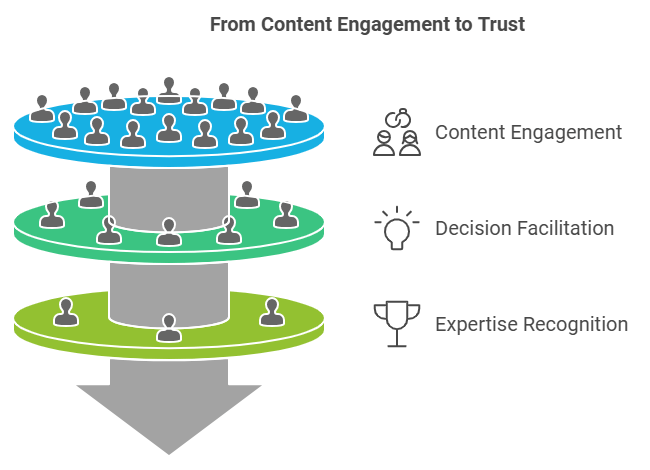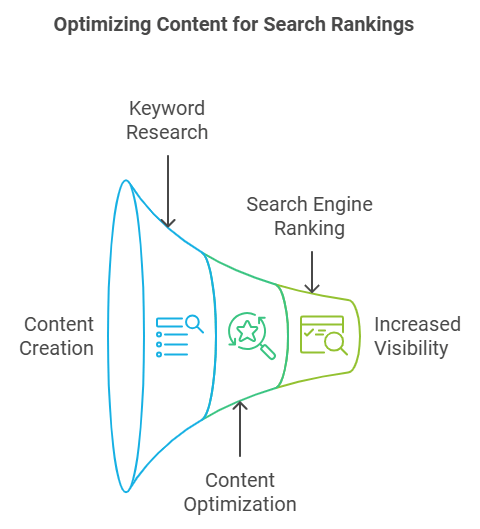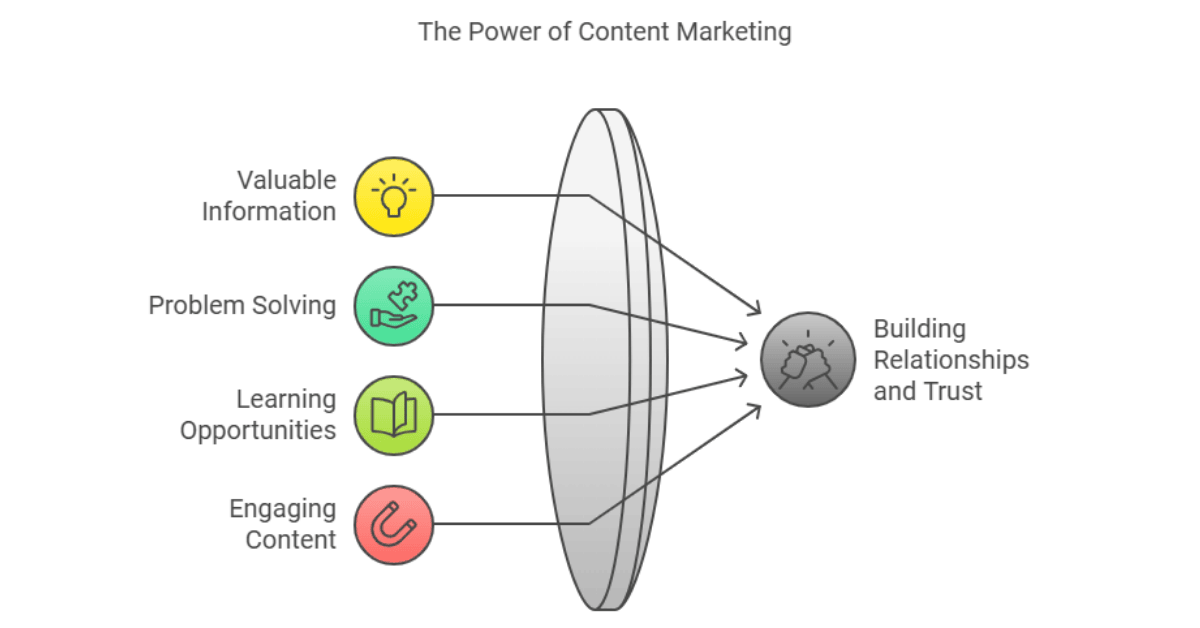Content marketing is about creating and sharing valuable information that helps people solve their problems, learn something new, or enjoy engaging content. Unlike traditional ads, it doesn’t push products directly. Instead, it builds relationships and trust over time. Let’s dive deeper into why this approach is essential for businesses.
Connecting With Your Audience
1. People Trust Content More Than Ads

Think about the last time you clicked on an ad. It probably wasn’t often, right? Most people skip ads or block them because they feel intrusive. On the other hand, people actively seek useful or entertaining content.
For instance, if you’re planning a trip, you might read a blog about “top travel destinations” or watch a video about “packing tips.” These pieces of content guide you and make your decisions easier. This is why content marketing works so well — it aligns with the audience’s needs.
A great example is a fitness trainer sharing a YouTube video titled “10-Minute Home Workout for Beginners.” This video offers value and positions the trainer as an expert. When viewers want personal training or online courses, they’ll likely turn to this trainer.
2. Reaching People Who Are Already Interested
Traditional ads often target people who may not care about your product or service. Content marketing does the opposite. It focuses on people actively searching for solutions or learning about a topic.
For example, a company selling gardening tools could create blog posts like:
- “How to Start a Vegetable Garden.”
- “5 Tools Every Gardener Needs.”
When someone searches for these topics, they find the company’s blog, learn something useful, and discover the brand. These visitors are more likely to become customers because the content matches their interests.
3. Building Long-Lasting Relationships
Content marketing is not about one-time interactions. It’s about building trust and staying connected with your audience. By consistently sharing helpful or entertaining content, you show that you care about their needs.
Let’s say a skincare brand publishes weekly tips like:
- “How to Choose the Best Sunscreen for Your Skin Type.”
- “Simple Nighttime Routines for Healthy Skin.”
Readers who find these tips useful will remember the brand. They might subscribe to its newsletter or follow it on social media. Over time, this trust can turn readers into loyal customers who recommend the brand to others.
Why Content Marketing Drives Business Growth
Content marketing doesn’t just build trust—it drives real business results. It attracts more people to your brand, increases engagement, and helps convert visitors into paying customers. Let’s explore how.
1. Increasing Brand Awareness
Creating content helps you reach people who have never heard of your brand before. By sharing valuable information, you introduce your business to a larger audience and become more recognizable.
For example, a local bakery might create a blog titled “10 Easy Cake Decorating Tips.” Someone searching for cake ideas might find this article, enjoy the advice, and discover the bakery. Even if the reader isn’t local, they might share the post or follow the bakery on social media.
Sharing your content across platforms like Instagram, YouTube, or Pinterest expands your reach even further. You can attract new audiences and make your business visible in places where potential customers already spend time.
2. Establishing Authority and Trust
When you share expert knowledge, your audience begins to see you as a leader in your industry. This builds trust and makes it easier for customers to choose your business over others.
For example:
- A financial planner could write a guide called “How to Save for Retirement in 10 Simple Steps.”
- A tech company could share tutorials like “5 Ways to Protect Your Data Online.”
These types of content prove you know your field. When readers see your expertise, they’re more likely to trust your products or services.
Additionally, regular content helps you stay visible. Imagine a law firm that publishes monthly articles like “Understanding Tenant Rights” or “How to Handle Small Business Taxes.” Over time, they become the go-to resource for legal advice in their community.
3. Generating Website Traffic
When your content matches what people search for online, it can drive a steady stream of visitors to your website. This is where Search Engine Optimization (SEO) plays a key role.
For example, a small business selling eco-friendly cleaning products could create a blog titled:
- “Why Natural Cleaning is Better for Your Home and Health.”
By using SEO keywords like “natural cleaning tips,” the blog has a higher chance of appearing on search engine results pages (SERPs). The result? More people visit the site, learn about the products, and may decide to purchase.
Over time, consistent traffic from well-optimized content can lead to better brand recognition, more leads, and higher sales.
4. Moving Customers Through the Sales Funnel
Content marketing helps guide customers from the first interaction to making a purchase. The process looks like this:
- Awareness Stage: Someone finds your blog or video while researching a topic.
- Consideration Stage: They explore more of your content and start comparing options.
- Decision Stage: Your content convinces them to choose your product or service.
For example, a SaaS company offering project management tools could create:
- Blog posts like “5 Signs Your Team Needs a Better Workflow.”
- Case studies showing how their tool improved productivity for other companies.
- Free trials or demo videos to help potential customers take the final step.
This journey builds confidence and makes it easier for customers to commit.
Combining Content Marketing and SEO for Maximum Impact

Content marketing becomes even more powerful when paired with Search Engine Optimization (SEO). Together, they help your content get discovered by the right audience at the right time. Let’s explore how this combination drives even better results.
1. Ranking Higher on Search Engines
Search engines like Google aim to show users the most helpful and relevant content. When you optimize your blog posts, videos, or guides with the right keywords, your content has a better chance of appearing at the top of search results.
For instance:
- A travel company might write an article titled “Best Destinations for Solo Travelers in 2024.”
- By including keywords like “solo travel tips” and “top destinations for solo trips,” they can attract readers actively searching for these terms.
High rankings don’t just bring more traffic—they also build credibility. People trust websites that appear on the first page of search results.
2. Creating Evergreen Content
Evergreen content stays relevant over time, bringing continuous traffic to your website. Topics like “How to Plant a Vegetable Garden” or “Beginner’s Guide to Meditation” are examples of evergreen content.
Let’s say you run a fitness blog. You write an article titled “10 Easy Exercises for Beginners.” This topic remains useful year after year. With occasional updates, it can consistently attract new readers who are just starting their fitness journey.
Evergreen content also boosts your ROI (return on investment). A single blog post can drive traffic and leads for years, unlike ads, which stop working as soon as the budget runs out.
3. Building Topic Authority
Search engines reward websites that cover topics in-depth. This is known as establishing topical authority. When your content thoroughly explores a subject, it signals expertise to both readers and search engines.
For example, an e-commerce store selling skincare products could create a series of blogs:
- “How to Build a Skincare Routine for Oily Skin.”
- “Top Ingredients to Avoid in Skincare Products.”
- “Morning vs. Nighttime Skincare: What’s the Difference?”
Together, these articles position the brand as an authority on skincare. This not only improves rankings but also keeps readers engaged on the website longer.
4. Driving Better ROI
Content marketing paired with SEO offers one of the highest returns on investment compared to other marketing methods. Why? Because once your content ranks well, it continues to bring in traffic without additional costs.
Let’s compare:
- Paid Ads: You pay for every click, and once the budget ends, so does the traffic.
- SEO Content: A well-optimized blog or video brings organic traffic for months or even years.
For example, a legal services company might create a guide titled “Steps to Set Up a Small Business.” Over time, as it ranks higher on Google, this guide brings in consistent leads from entrepreneurs searching for help.
5. Standing Out in a Competitive Market
In crowded industries, content helps your business shine. It allows you to differentiate yourself from competitors by sharing unique insights and solutions.
Take the example of two companies selling home cleaning products:
- One company runs basic ads.
- The other shares detailed blogs like “5 Natural Ingredients for a Sparkling Clean Home.”
The second company builds trust by educating its audience. Customers are more likely to choose a brand that has already proven its value through helpful content.
Conclusion
Content marketing is not just a strategy—it’s an investment in your business’s growth. It helps you connect with your audience, establish trust, and build authority in your field. By pairing content marketing with SEO, you ensure that your valuable content reaches the right people at the right time, boosting visibility and driving long-term results.
To summarize:
- Content marketing builds trust: People prefer helpful, engaging content over intrusive ads.
- It increases traffic and leads: Well-optimized content attracts consistent organic visitors.
- It drives better ROI: Evergreen content delivers results long after it’s published.
- It helps you stand out: Sharing your expertise sets you apart from competitors.
Whether you’re a small business owner or part of a large company, content marketing is essential for sustainable success. Start creating valuable content today, and watch your business grow!
FAQs
1. What is content marketing in simple words?
Content marketing is creating and sharing useful information like blogs, videos, or guides. Instead of directly selling, it helps businesses build trust and connect with their audience.
2. How does content marketing help my business grow?
It helps by:
- Attracting new visitors to your website.
- Building trust and authority with your audience.
- Encouraging visitors to take action, like buying products or signing up for services.
3. Is content marketing expensive?
No, it’s often more affordable than traditional ads. For example, a single blog post can drive traffic for years without additional costs, making it a cost-effective option.
4. How long does it take to see results?
Content marketing takes time. You might start seeing some results within a few months, but long-term success comes from consistency and quality.
5. Can small businesses benefit from content marketing?
Absolutely! Small businesses can use content to compete with larger companies by focusing on their unique expertise and connecting directly with their target audience.
6. What types of content should I create?
It depends on your audience. Popular formats include:
- Blogs or articles.
- How-to videos.
- Social media posts.
- Infographics.
Start by identifying what your audience needs and create content that solves their problems.
7. How do I know if my content marketing is working?
Measure your success by tracking:
- Website traffic.
- Time spent on pages.
- Number of leads or conversions.
- Social media engagement (likes, shares, comments).
8. How do I combine content marketing with SEO?
Use SEO to help your content rank higher on search engines. Focus on:
- Choosing the right keywords.
- Writing clear, helpful content.
- Optimizing headlines, images, and meta descriptions.
This combination ensures that more people find your content.


